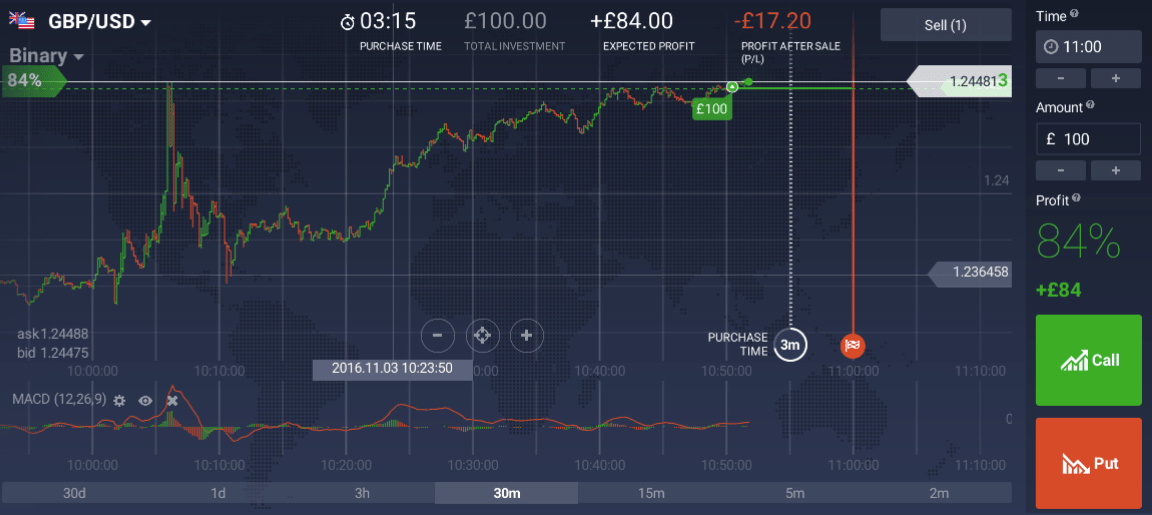Binary Options Vs Stock Trading
Binary Options vs stocks – just how different are they? Find out all you need to know about both binary options and stock trading so that you can make an informed decision regarding which is best for you. This article offers a comprehensive breakdown of their differences and similarities, in addition to a step-by-step guide that details how you can get started.
What Are Binary Options?
A binary option is a simple financial instrument that enables investors to speculate on whether the price of an asset will increase or decrease from its current value. Before you place a trade on a binary option, you know exactly how much you are set to gain or lose, as the risk and reward are predetermined. This is possible as you can only be right or wrong about the direction of price movement, hence the name “binary”. The simplicity that binary options offer is unique and inherent to their appeal.
The timeframe of a binary option is predetermined by the trader. It can be as little as one minute, meaning that it is possible to trade many times in a single day across any global market, or it can be months in the future. Either way, the position is automatically exercised so you do not need to spend time monitoring it. Profit or loss is determined by whether the final price is the correct side of the strike (starting) price.
Binary options can be taken out on almost any financial instrument and asset type, giving much more flexibility to binary options vs stocks. This also provides a good opportunity for hedging risk or diversifying portfolios.
Binary options involve high levels of risk and, as a result, they are not permitted in all countries. Most binary options trading is conducted via unregulated brokers, so scams and fraudulent operations must be watched out for.

What Is Stock Trading?
Stock trading vs binary options is the process of buying and selling company stocks, capitalising on price fluctuations to generate a profit. There are two primary types of stock trading; position trading and day trading.
The former typically implements a timing-focussed strategy that takes advantage of short-term events to turn a profit over weeks or months. Day trading is the process of buying and selling positions within a single day.
Stocks, also known as equities, refer to fractional ownership of a company. Most stocks are traded on a stock market, or an exchange. Some of the world’s largest exchanges include the New York Stock Exchange (NYSE), London Stock Exchange (LSE) and Tokyo Stock Exchange (TSE). Exchanges are regulated by government agencies to ensure that activities are fair and protect them from fraud.
There is generally considered less financial security with binary options vs stocks as the former tends to be carried out with unregulated brokerage companies.
Modern stock trading is thought to have originated with the trading of shares in the East India Company in London.
Binary Options Vs Stock Trading; Differences
- Barriers To Entry – One of the primary barriers to entry for stock trading is the high set-up fees. Starting out on the stock market with much less than $500 is tricky. There tend to be lower upfront requirements for binary options vs stocks, meaning that they are much more flexible and accessible.
- Variety – A key point in the binary options vs stocks debate is the former’s additional coverage of indices, futures and forex and you can trade them all through a single website. This range means that you can explore lots of exciting markets from one convenient place.
- Range Trading – Generating profit in the stock market largely relies on price movement and the more the better. When a market stabilises the opportunity to make money diminishes. Range trading binary options vs stocks offers a way to make money by correctly predicting that the market isn’t going anywhere.
- Losing Payouts – Many binary options brokers will give you a percentage of your money back when you lose a trade. The refund tends to be between 5 – 15%. This is reflected when you win a trade, the pay-out will be closer to the 75% mark.
- Timeframes – When trading stocks, you might have to wait hours or even days to see a profit. Binary options give you a greater degree of flexibility over timeframes and you can see profits in just a few minutes.
- Risk – There is generally considered to be more risk with binary options vs stocks as they are typically all or nothing trades, whereas equity trading losses depend on the level of price change.
- Commission – The stock market is largely inaccessible to traders that do not have large sums to invest upfront. In addition to a minimum deposit, brokers may charge withdrawal fees and wire transfer fees. Often, you are liable to pay these whether you win or lose. Binary options do not tend to carry the same charges. There are no fees, commissions or spreads eating into your profit, brokers earn their money from unsuccessful contracts.
- Ownership – When trading stocks or shares, you are effectively purchasing the shares. When trading binary options, you do not purchase the shares themselves, only the stock options, so you never own the underlying asset. This increases convenience and execution speed while decreasing costs.
Binary Options Vs Stock Trading; Similarities
It is not all contention for binary options vs stocks, there are some similarities:
- Facilitators – Both binary options and stocks tend to be traded on a stock market or exchange.
- Movement – For the most part, accurately predicting fluctuations in the price of an asset provides the opportunity for profit generation.
- Risk Management – As with trading any asset, in any market and on any exchange, traders should always have a robust risk management strategy in place.
- Scams – Unfortunately, scams and fraudulent operations exist in both parties of the binary options vs stocks debate. We would always recommend that traders choose a regulated broker where possible to minimise risk.
How To Trade Binary Options Vs Stocks
Getting started is quite similar for binary options vs stocks. The following step-by-step guide outlines the process to begin trading.
- Select A Broker – For many, this can be the most difficult part. Ensure you check that rates are competitive, security is robust and the platform offers the tools you require. For more details on how to choose the best binary options broker, see our guide.
- Choose An Asset – The range of assets available to trade is extensive. You will need to consider forecasts, fees and any technical analysis you have carried out.
- For Binary Options – Select the expiry time, options can expire anywhere between 30 seconds and one year.
- Input The Trade Size – When trading binary options, 100% of your investment is at risk, so ensure that you consider the amount carefully. The same is also technically true for stocks, but the company would have to go bust for you to lose it all.
- Confirm The Trade – Double check that all details have been entered correctly before confirming the trade.
Security
Whichever side of the binary options vs stocks competition you are on, scams and fraud are an issue. As a relatively new, exotic instrument, binary options trading, in particular, sees a fair amount of dishonesty.
The best way to stay safe is to find a regulated, transparent broker. We have listed a couple of key points to help determine whether a broker is right for you:
- Research – Comb popular forum sites, read reviews and check industry-specific sites to get a good feel for client reception. Remember that everyone’s experiences will be different but they offer a good indication as to whether a broker can be trusted.
- Regulation – Is the broker licensed by a reputable body? Do they follow the relevant regulation to be in operation?
- Demo Accounts – These are a great way to scope out a broker risk-free. Where possible, ensure you make the most of a demo account to get to grips with the platform, assets and services offered.
- Fees – From transactions charges to spreads, make sure you understand the entire fee structure. If you are particularly interested in brokers with low minimum deposit requirements, check that out too.
- Islamic Accounts – If you are one of the growing numbers of traders that are seeking interest-free trading accounts, make sure the broker provides an Islamic account.
Final Word On Binary Options Vs Stocks
It is easy to understand the appeal of binary options vs stocks. The simplicity and variety they offer are unique in the often complicated world of trading. If you’re looking for high-risk, high-return trading, binary options could be a great bet for you. However, if you do opt to trade binary options, ensure that you have a comprehensive risk management strategy in place and that you are only putting on the line what you can afford to lose.
Stocks, meanwhile, offer a less lucrative, less risky alternative. They are widely traded across the world so traders can enjoy a breadth of choice in brokers and markets. Ultimately, the primary determinant should be risk appetite as there is no getting away from the high levels of risk that come with binary options trading.

FAQs
Binary Options Vs Stocks, Which Is Better?
It very much depends on what you’re looking for. If you’re looking for risky yet rewarding returns, then binary options are a good solution. Meanwhile, stock trading can offer less volatile odds. Binary options are not permitted in every market, so be sure to check that you can trade them locally.
How Can I Get Started Trading Binary Options?
First, you’ll need to find a broker that offers binary options and then select your asset, market and expiration time. For a complete guide, see our article above.
Which Are The Best Brokers For Binary Options?
Most binary options brokers are unregulated as, in the US and UK markets, their trading is not permitted. We recommend that, where possible, you ensure that you are trading with a regulated broker.
Can I Trade Binary Options In The UK?
Due to the high levels of risk and misleading simplicity, it is not currently possible to trade binary options in the UK unless you open an account with an unregulated provider. The odds are considered risky with traders left open to incurring significant losses.
Binary Options Vs Penny Stocks, How Different Are They?
A penny stock refers to a stock that is valued at less than $5 per share. Some penny stocks are traded on big exchanges but more trade over-the-counter (OTC). Binary options tend to have a higher value and are most often traded on large exchanges like the NYSE, NASDAQ and FTSE.
